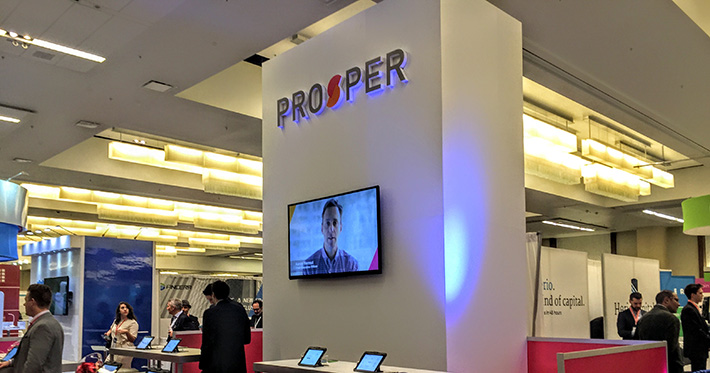Loans
Prosper Marketplace Originated $891.9M in Loans in Q2, Records $42.6M Profit
August 23, 2022 Despite some uncertainty in the lending markets, Prosper Marketplace had a fairly good quarter. The company originated $891.6M in loans in Q2, nearly double the volume over the same period last year. Profitability too was there, coming in at $42.6M, up from a loss of $5.8M in Q2 2021.
Despite some uncertainty in the lending markets, Prosper Marketplace had a fairly good quarter. The company originated $891.6M in loans in Q2, nearly double the volume over the same period last year. Profitability too was there, coming in at $42.6M, up from a loss of $5.8M in Q2 2021.
Notably, Prosper did acknowledge that the fair value of its loans were being affected by an increase in capital markets volatility and benchmark interest rates but neither were enough to hurt the company.
Prosper is a holdout of the peer-to-peer lending era in that it still has a “note channel” for investors. Ninety-one percent of all loans funded in the second quarter, however, were done through the Whole Loan Channel, up from 87% during the same period last year.
Prosper is in the business of originating consumer loans with 3-5 year terms and interest rates ranging from 5.31% to 31.82%.
Need a “Lenda?”
July 13, 2022LendingTree helped Linda get a “lenda.” Former SNL star Molly Shannon, playing Linda, explains to waitress, Brenda, how hassle-free finding a personal loan through LendingTree was for her. The newly released commercial uses assonance to get viewers to understand how easy it is to get the best possible loan. In the commercial, Brenda is under the impression that LendingTree is only for “big spendas” but learns that they will find her a lender despite the circumstances.
Another “Linda lenda” commercial is featured on LendingTree’s home page where Linda tells her niece how they assisted her on a home loan as well. The objective is get viewers to understand how getting a loan can be just as effortless for them as it was for Linda.
New Owner of Loan.eth Says its Worth Millions
June 8, 2022 Less than two months after spotlighting a new domain name market linked to the Ethereum blockchain, the name loan.eth was sold on a secondary market for the equivalent of $45,000. It’s not a website domain like one would expect with a .com or a .net, but rather a crypto wallet address shortener that can double as a screen name and authentication service on web 3.0. That’s just the tip of the iceberg of the utility that a .eth domain can offer.
Less than two months after spotlighting a new domain name market linked to the Ethereum blockchain, the name loan.eth was sold on a secondary market for the equivalent of $45,000. It’s not a website domain like one would expect with a .com or a .net, but rather a crypto wallet address shortener that can double as a screen name and authentication service on web 3.0. That’s just the tip of the iceberg of the utility that a .eth domain can offer.
Although most people may not be familiar with .eth domain names, the new owner of loan.eth, who goes by @BloomCapital_ on twitter, is so confident that such names will be adopted in the future, that he believes the value of this one will be many times what he paid for it.
“Just so it has to be said, Loan.eth won’t be sold for less than $10M,” Bloom wrote. Bloom said he considers loan to be the top .eth name that he has.
Prosper Marketplace Receives Full Forgiveness of Its SBA Loan
May 18, 2022 Three months after the SBA told a Sioux Falls small business lender that it wasn’t eligible for PPP loan forgiveness because it was involved in lending, the same agency approved full forgiveness for one of the nation’s largest consumer lending businesses, Prosper Marketplace.
Three months after the SBA told a Sioux Falls small business lender that it wasn’t eligible for PPP loan forgiveness because it was involved in lending, the same agency approved full forgiveness for one of the nation’s largest consumer lending businesses, Prosper Marketplace.
“On March 21, 2022, we were notified by the SBA that all principal and interest under our PPP loan, totaling $8.6 million, was forgiven through a full forgiveness payment made on March 15, 2022 by the SBA to the lender of our PPP loan,” Prosper reported in its Q1 earnings. The company also announced that it had facilitated $560.6M in Borrower Loan originations in the first three months of this year so far.
Technically, Prosper is a “credit marketplace.” All loans originated through the marketplace are made by WebBank. Prosper facilitated $1.9B in loan originations last year alone.
Prosper was among the lenders that actually turned a profit in 2020, $18.5M to be precise, on $1.5B in loans facilitated.
Developed and Developing Credit Markets, How Many People Are Actually Underserved or Unserved?
April 7, 2022 TransUnion recently conducted a global study, “Empowering Credit Inclusion: A Deeper Perspective on Credit Underserved and Unserved Consumers.” Both developed and developing credit markets were observed including the United States, Canada, Colombia, Hong Kong, India, and South Africa. The study further focused on the journey of credit disadvantaged consumers and how they migrate from being underserved to credit served, and the ability to gain access to additional credit opportunities. New-to-credit consumers – individuals who have opened their first product within the past two years – were not considered.
TransUnion recently conducted a global study, “Empowering Credit Inclusion: A Deeper Perspective on Credit Underserved and Unserved Consumers.” Both developed and developing credit markets were observed including the United States, Canada, Colombia, Hong Kong, India, and South Africa. The study further focused on the journey of credit disadvantaged consumers and how they migrate from being underserved to credit served, and the ability to gain access to additional credit opportunities. New-to-credit consumers – individuals who have opened their first product within the past two years – were not considered.
Among the US market, about 45 million consumers have been categorized as unserved or underserved. Approximately 8.1 million are unserved or invisible to the credit bureau while 37 million are underserved, resulting in 14% of the adult population.
In developed countries versus emerging economies there is a large contrast between what percent of the population is still credit unserved. In Canada about 7% of the adult population is unserved while Colombia’s percentage reaches 44% and India is at 63%.
Nidhi Verma, Vice President, International Research and Consulting at TransUnion stated, “…I think a lot of it has to do with, it’s not a saturated market quite yet, in terms of the presence and the availability of credit access, and consumers actually having to rely on credit or understanding the importance of private credit in their daily lives. And that’s generally the essence of a developing credit economy.”
According to the study credit migration decreased post-pandemic amongst all regions. Two cohorts of consumers were analyzed, each over a two-year time period. The first during the pre-pandemic period from March 2018 to March 2020 and the second through June 2019 to June 2021.
Around one in four consumers identified in the underserved population were becoming credit served pre-pandemic. Due to the pandemic there was a drastic halt and a cut back in lending. The migration rate of transitioning from being underserved to served from a credit perspective went down from 24% to about 22% not only in the US but within other global markets as well.
Unserved consumers are faced with a “chicken and egg conundrum” of how to get their first credit card without a credit score or credit history. Although many lenders are hesitant to extend credit to these consumers, alternative data is an option.
“Especially in the current environment, where most lenders, financial services are seeking to grow their portfolio,” said Verma, “there’s certainly a huge opportunity of acquiring these new customers that have no scores or credit history, and leveraging incorporating alternative assets, such as your rental information, such as your deposit account information, incorporating that in the underwriting strategies, so we find fewer consumers to be credit invisible.”
This is applicable for both a growth for lenders and consumers to potentially find an upward mobility with the ability to get better access to credit, financial products, and services.
“Having access to credit, without overextending, can help consumers with a financial situation in daily life and alternative data, which would be just basically one of the gateways to enable that credit score for consumers,” Verma noted.
According to Verma, TransUnion is making efforts to help those who are credit invisible be seen. “We’ve continued to invest and enable alternative data assets, solutions in each of the markets to make sure that those can be incorporated for lenders to make lending decisions in lending criteria.”
Alternative data provides an opportunity for more consumers to become visible with credit history and in the credit market. This will also ensure to underserved consumers that there are more alternative products with lower cost of credit, a key finding that lenders could leverage in their day-to-day pricing and underwriting strategies.
BNPL Survey says 25% of Customers are “Financially Vulnerable”
April 3, 2022 The Financial Health Network, an organization that attempts to quantify the nation’s financial health, recently released the results of their first truly nationally representative survey titled Buy Now, Pay Later: Implications for Financial Health. The survey seeks to understand who uses Buy Now Pay Later (BNPL) and their experiences with the service, and touched on what kind of financial habits are coming about for those BNPL use.
The Financial Health Network, an organization that attempts to quantify the nation’s financial health, recently released the results of their first truly nationally representative survey titled Buy Now, Pay Later: Implications for Financial Health. The survey seeks to understand who uses Buy Now Pay Later (BNPL) and their experiences with the service, and touched on what kind of financial habits are coming about for those BNPL use.
“Buy Now Pay Later could be a mixed bag for consumers–on the one hand it provides a convenient and low-cost way for consumers to finance purchases, but there are customers who are using BNPL to make purchases they would not otherwise make,” said Meghan Greene, director of research at Financial Health Network.
According to the release, the data found that roughly one in four users of BNPL are financially vulnerable. Out of this group, a quarter of BNPL users reported struggling to make payments. With this, the survey later mentions that 92% of users reported no difficulty making payments, and 99% stated that they understood the terms and conditions of the product.
“It’s still too early to know the full impact of BNPL on the financial health of consumers, but we do see potential warning signs in the number of consumers,” Greene said. “Particularly those who are already financially vulnerable, who report struggling to make repayments.”
Out of those surveyed, 47% said they would not have made a purchase or spent more than they otherwise would have spent had BNPL not been available. With this being said, it seems that BNPL executives are getting exactly what their product is marketed to retailers to do.
There are many types of plans using the BNPL label ranging from plans which divide payments into four installments with no interest charge (“pay in four”) to longer-term installment loans. Companies like Ikea, Walmart, Urban Outfitters, and thousands of other global businesses have gotten into offering these financial products.
Other interesting finding from the survey are below-
–Short-term BNPL users reported owing an average balance of $330.
–10% of households report having used BNPL in the 12 months prior to November 2021, a significant deviation from other published estimates. Of these, 70% report using a short-term, no-interest BNPL plan.
–Younger and less financially healthy households are more likely to use BNPL. Financially Vulnerable households, as measured using the Financial Health Network’s innovative FinHealth Score(R), are nearly four times more likely to use BNPL than Financially Healthy households (18% vs. 5%). In fact, almost one-quarter (24%) of BNPL users are Financially Vulnerable.
–Despite the recent emergence of BNPL in the United States, almost half (46%) of users had used BNPL three or more times in the previous 12 months, as of November 2021.
–Total U.S. consumer spending on interest and fees from BNPL in 2021 is estimated at less than $1 billion, a small fraction of the estimated $95 billion spent on revolving credit card balances.
–Over 20% of BNPL users do not have or do not use credit cards (roughly the same as non-users).
–More than 40% report having subprime credit scores.
–One in three users of BNPL report that they would not have made the purchase if BNPL were not available. Among Financially Vulnerable BNPL users, over 60% said they would not have made the purchase without BNPL.
Could Siri, Alexa, and Video be the New Frontier for Lenders?
January 25, 2022 The annual fintech study published by Smarter Loans revealed that 25% of respondents had used either Alexa, Siri, or another voice search to find information about financial services.
The annual fintech study published by Smarter Loans revealed that 25% of respondents had used either Alexa, Siri, or another voice search to find information about financial services.
Voice devices, it appears, are not only getting better at answering regular questions, but users are also getting more comfortable even asking them in the first place.
“Alexa, what is deBanked?” for example, returns an accurate reply despite our not having made any efforts to opt-in to the device’s knowledge base. Alexa just knows.
So why bother performing an old-fashioned Google search? Turns out, it’s becoming less common to do. Only 57% of respondents said they discovered the lender they applied with through online search. 13% said they discovered them through social media. 8% came from a friend’s recommendation. 15% found them through a well-regarded “Loan & Financial Directory” (Smarter Loans, who authored the study).
Once on a lender website, users had questions. 27% read online articles and reports, 37% read reviews, 16% called the company, and 9% consulted a friend or family member.
60% of respondents said informative videos about a company or its products would increase their confidence in that company. That could be key since 66% of respondents said that they researched more than 3 lenders before applying for a loan.
All of the respondents resided in Canada. 92% of respondents also said that they were satisfied or very satisfied with their loan provider.
The Crazy Lawsuit Against Marcus Lemonis Was Dismissed
November 11, 2021The supposed bombshell lawsuit filed by Nicolas Goureau, Stephanie Menkin, and ML Fashion against Marcus Lemonis has been dismissed. Despite the sensational allegations that enabled Forbes to pen a major story, the Court found the entire lawsuit defective and dismissed it altogether on October 15.
The plaintiffs have advised the Court that they intend to try again by filing a second amended complaint. That would in fact make it their third attempt to try even getting past the opening stage of litigation.
The dismissed lawsuit had been packaged up to make headlines, opening with a monologue about it being the culmination of an “eight-month investigation” carried out with the help of a “former district attorney and a top law school professor, and a world renown psychiatrist that was spurred by the coming forward of no less than seventy (70) family businesses that have been destroyed…”
Despite all this, the judge ordered the suit “dismissed in its entirety.”





























